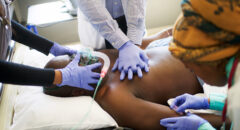
People who struggle to sleep must address the problem. Limit screen time, exercise more, and sleep earlier, warn experts. Blackout curtains, earplugs, and other traditional remedies don't always work. Black Americans sleep worse than whites, sometimes for reasons beyond their control. Health professionals must explain sleep in the context of a person's life and surroundings. sleep deprivation
Disparities In Sleep From Social & Environmental Factors
Mercedes Carnethon, vice chair of preventive medicine at Northwestern University's Feinberg School of Medicine and an expert on racial inequalities in cardiovascular disease believes social and environmental factors contribute to sleep variations. Poor sleep has wide-ranging consequences. Sleep deprivation is connected to heart disease. Heart disease, the leading cause of death in the U.S., may be lowered if more people get enough sleep. This year, the American Heart Association recommended getting adequate sleep.
Lauren Hale, a professor of preventive medicine and sleep behavior expert at Stony Brook Medicine, says good sleep for everyone might reduce racial, ethnic, and socioeconomic disparities in cardiometabolic illnesses. Two hundred and twenty-nine Backs per 100,000 died of heart disease in 2020, compared to 170 whites. Some studies suggest that at least half of racial disparities in cardiometabolic disease risk are linked to sleep patterns.
Hale says sleep hygiene advice ignores systemic disparities. "Sleep research must be turned into scalable, sustainable medicines," she adds.
RELATED: Is Sleep Deprivation Triggering the Onsets of Your Migraines?
Structural Racism Fundamentally Causing Sleep Inequities
Sleep is hard to examine since it happens outside a lab. Sleep is multifaceted, says Kristen Knutson of Northwestern's Feinberg School of Medicine. Sleep length, quality, and timing affect health. According to the CDC, one-third of Americans sleep fewer than seven hours every night. It likely misses many nighttime wakers.
Despite the ubiquity of ordinary sleep disturbances, "sleep medicine has generally focused on clinical sleep disorders," including obstructive sleep apnea and insomnia, says NYU's Natasha Williams. These illnesses are easier to diagnose and cure than sleep disorders; in detecting and treating serious diseases, race and socioeconomic status matter. This all-encompassing strategy ignores millions of people, disproportionately Black, whose lack of sleep puts them at risk for cardiometabolic disease and death.
Racism affects sleep.
RELATED: Consequences Of Sleep Deprivation
Undercutting Opportunity In Restorative Sleep & Cardiovascular Health
Separating sleep from other factors contributing to cardiovascular diseases, such as diet, exercise, or weight, is difficult. Unhealthy habits go hand-in-hand. Poor sleep inhibits exercise and healthy nutrition. Unhealthy food or activity may cause poor sleep, perpetuating the cycle. Loops may promote cardiometabolic deterioration. Poor sleep increases the risk of Black obesity, hypertension, and diabetes. Each of these conditions causes disturbed sleep; someone with diabetes may get up at night to urinate. This might worsen and produce new disorders.
Emory University's Rollins School of Public Health assistant professor Dayna Johnson studies sleep health inequities and cardiovascular disease. Racism impairs sleep and heart health. Experts claim chronic stress impairs sleep. Socioeconomic factors, interpersonal stress, racism, and prejudice may affect sleep. Racial and ethnic sleep disparities are caused by heightened alertness, fear of discrimination or mistreatment, and neighbor suspicion. To sleep well, one must be relaxed and not be hypervigilant.
Not all races benefit from rising affluence. Wealthier people sleep better. High-income, well-educated Black Americans sleep worse than whites, taking longer to fall asleep and staying awake longer in bed. Black and white professionals sleep less than blue-collar workers. Higher-income Black people may be in the minority at work or in their communities, increasing their racism and prejudice, according to some scholars.
To Sleep Well, One Needs To Feel Safe
Feel safe to sleep well. Housing discrimination causes financial and environmental disparity, which impairs sleep. Redlining, which barred Black Americans from purchasing homes in certain areas until the late 1960s, created neighborhoods with poor sleep conditions, including noise, light, poverty, and air pollution. Decades of discriminatory practices have rendered scientifically proven sleep hygiene advice unavailable to those at risk for cardiovascular disease and death.
Climate and environment impact sleep disparities. Without air conditioning, low-income urbanites may have problems sleeping. Closing windows may suffocate by trapping noise, light, and air pollution. Temperature affects sleep quality. People in cities lacking green spaces, who are already at risk for heart disease, have restless evenings.
Low-income Blacks have financial, nutritional, and housing challenges that postpone sleep. They work many jobs, making it hard to sleep regularly. More family members or high-density apartments may have less noise control. In a summer research, Johnson and two colleagues coined the term "sleep deserts." Like food deserts, these areas have poor sleep. Sleep poverty "is not merely individual action," according to Johnson. Context counts.
RELATED: Surprising Effects Of Sleep Deprivation
Not As Simple As "Go Sleep More"
Sleep and cardiovascular health experts suggest ways to reduce structural racism's insomniac consequences. Knutson says suggestions must be reasonable and effective. "Sleep more, exercise more, eat better' isn't enough," Knutson adds. "Everyone's priorities change every hour. Nobody sleeps enough. Priorities include paying bills and caring for kids.
Multidimensional sleep "gives us possibilities to improve sleep that isn't just about quantity," Knutson says. Can it be more consistent? Which sleep component may improve heart health? Many people sleep 5-6 hours. If so, she suggests getting regular sleep. This is important for individuals who work after hours, Hale says. She says that many people don't feel safe wearing earplugs while sleeping for fear of not hearing an intruder. She suggests utilizing white noise to soften outdoor sounds, which can be controlled.
RELATED: Sleep Deprivation: 9 Tips for a Good Night’s Sleep
Improving Environments & Communities
Increasing sleep to minimize CVD inequities requires economic and community improvements. Johnson says we must examine the context to reduce sleep inequities. She helps people improve their home's insulation and ventilation to improve sleep and save money on heating and cooling. Educating more doctors of color and physicians about sleep might help heart-risk areas. In a basic care appointment, physicians concentrate on measurable, curable clinical issues like weight, high blood pressure, or diabetes rather than sleep; experts told STAT.
Millions of women might avoid cardiovascular illness with simple screenings. Researchers predict policy changes will influence sleep equity long-term. Johnson says that affects community structure and public health budgets. Stricter limits on air and noise pollution might improve sleep conditions, especially in heart disease-prone areas, even when donations weren't about sleep. Community investment improves sleep, Hale and her colleagues found. People in a primarily Black and low-income region who lived near new community assets (such as a grocery store, park, or community center) slept better during a three-year period, according to 2021 Sleep research.
Hale says improving ecosystems and communities benefits people. Another policy is cautiously hopeful. Schools are starting later nationwide. Whether a high schooler arrives at 7:30 or 8:30 a.m. may not affect their cardiovascular disease risk decades later. Racial sleep disparities begin before adulthood and increase heart disease risks. Later start times improve pupils' health and learning, which might lessen socioeconomic differences.
Health education involves encouraging people to listen, learn, and change their behavior, Hale adds. "When a structural state changes, [behavior] changes" – a rising tide lifts all ships regarding health disparities. National efforts may reduce sleep and heart health disparities. Johnson mentions minimum wage's health advantages. They'd sleep better if folks could support their families with a single-day job.









